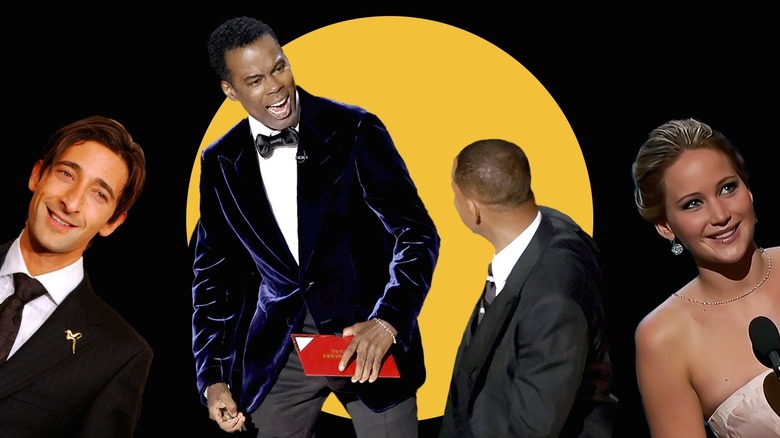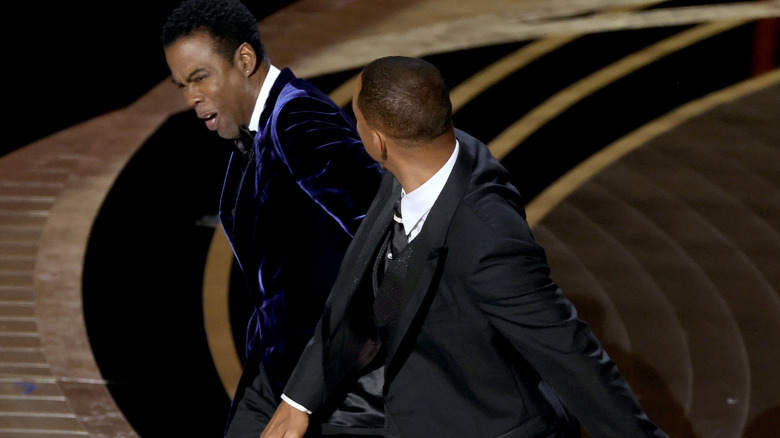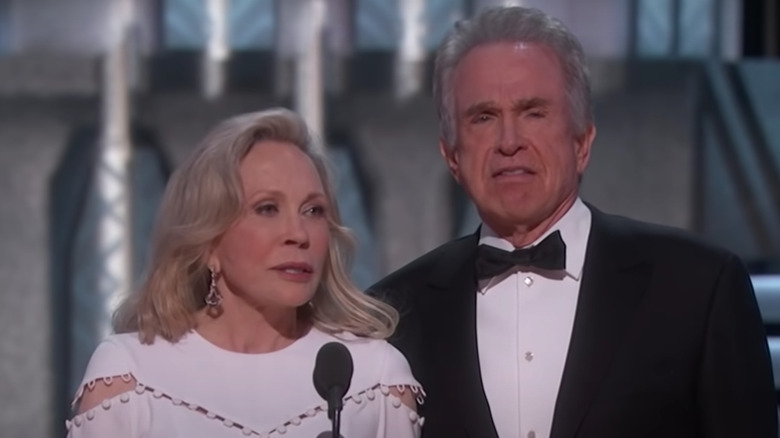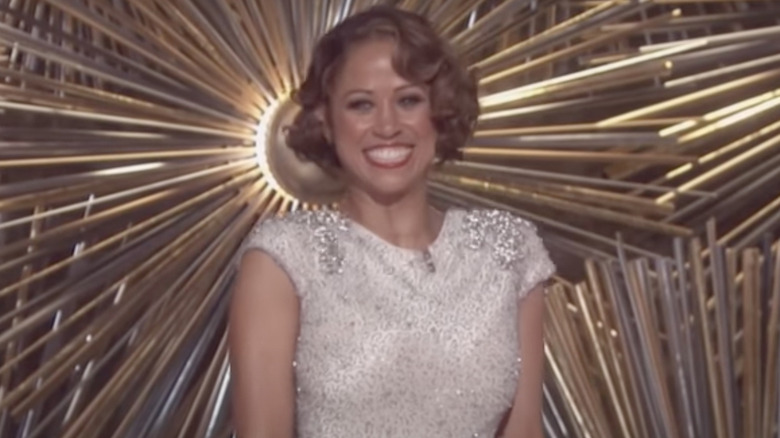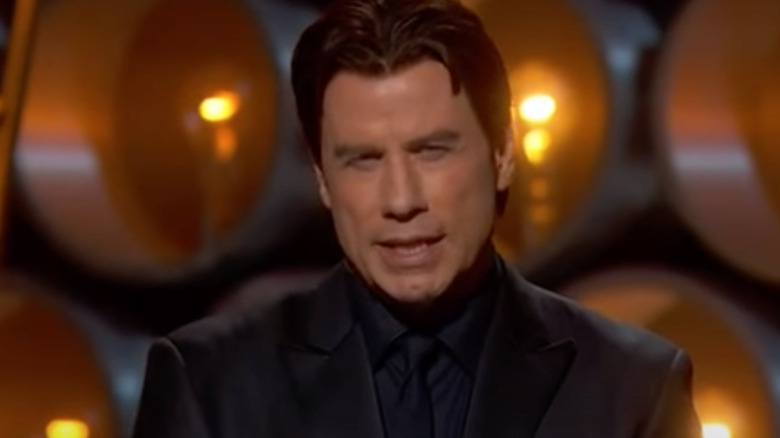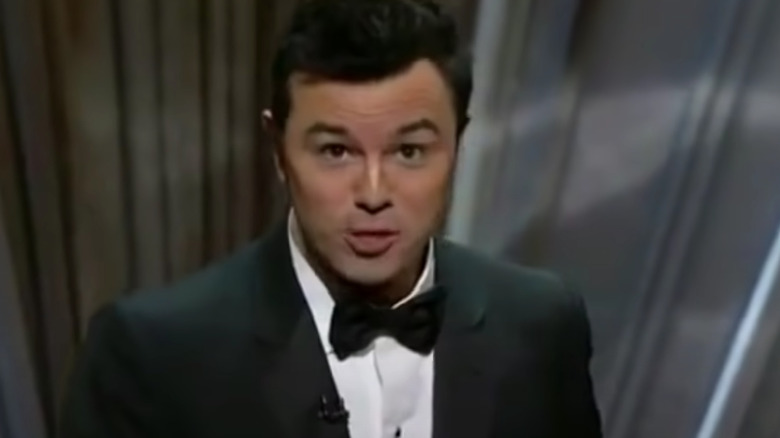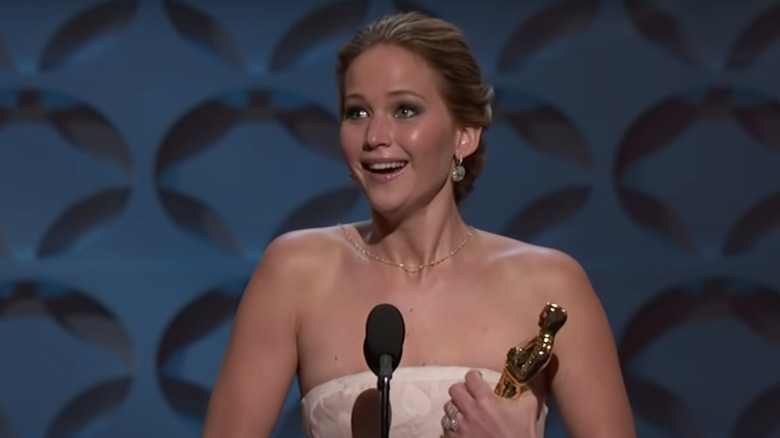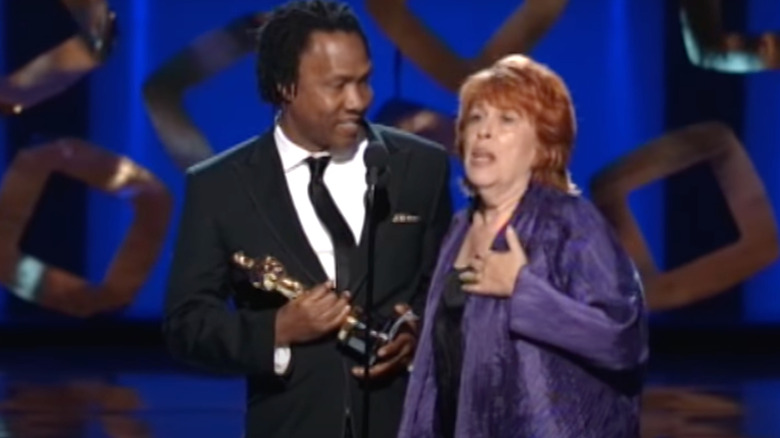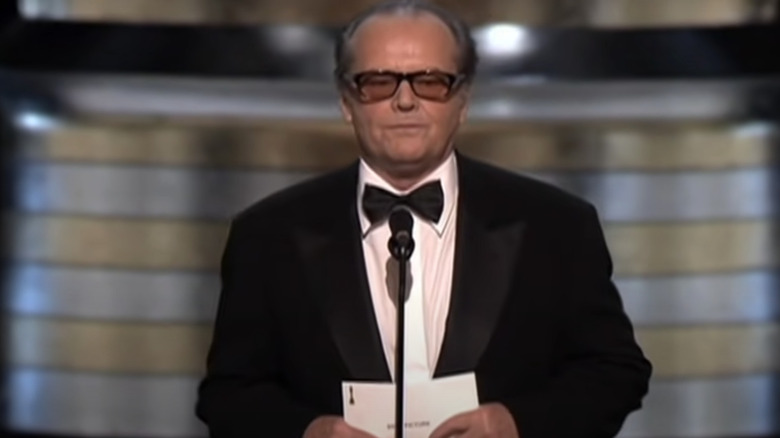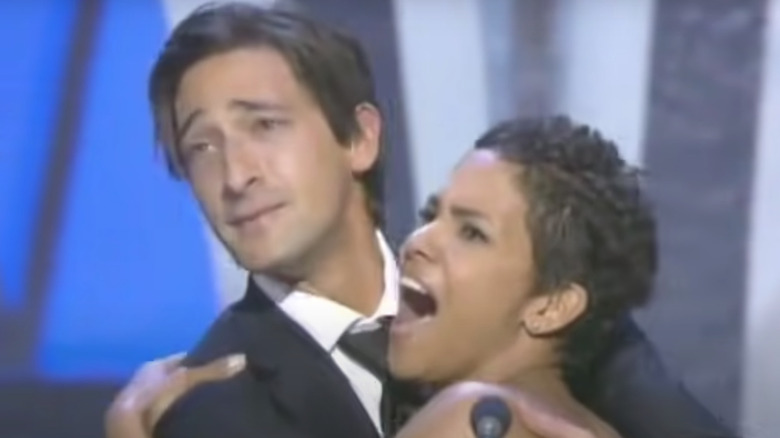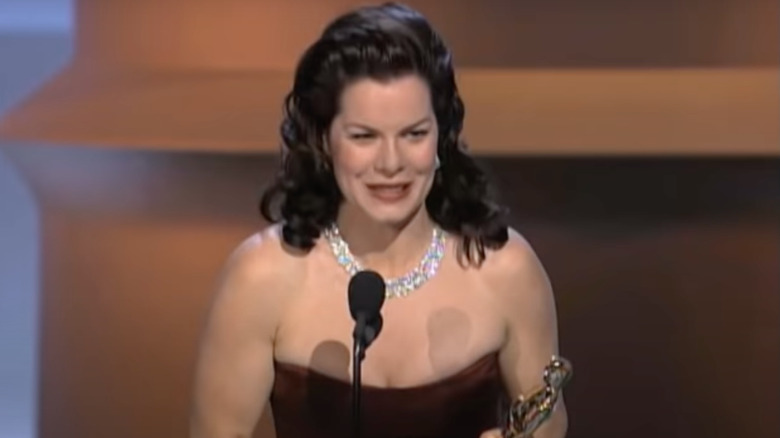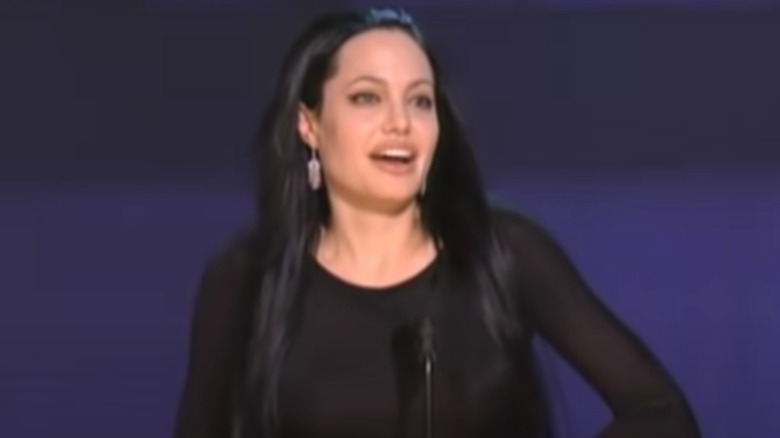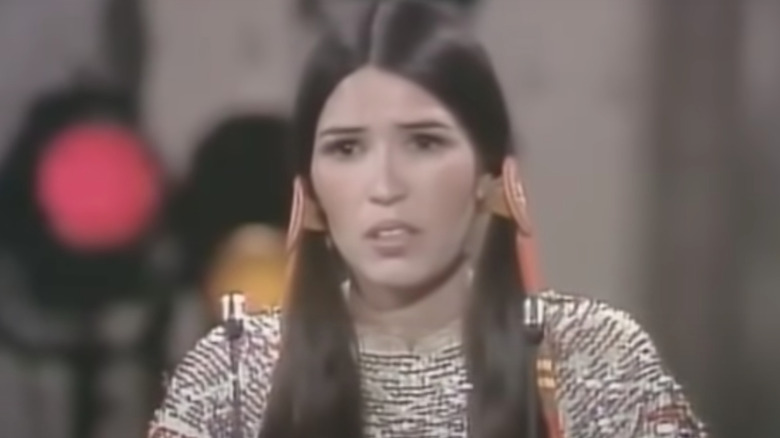The Most Jaw-Dropping Oscars Moments Of All Time
The Oscar stage is arguably one of the most reliable settings for audiences to witness live televised drama. From last year's disturbing on-stage violence and stunning winner upsets to problematic attempts at comedy and controversial acceptance speeches, the annual Academy Awards ceremony always seems to feature a plethora of headline-grabbing moments.
Although overall viewership for the film industry's biggest night has discouragingly waned with each passing ceremony, the Oscars still manage to generate memory-searing, zeitgeist-capturing milestones year after year, for better or worse. The prospect of winning — or, in some cases, losing — the most coveted prize in the entertainment industry can prove quite daunting. It often propels recipients and losers alike to cave to all the simmering emotions and awards season-long pressure, usually gracefully, but sometimes out of turn. With the Academy of Motion Picture Arts and Sciences' 95th Academy Awards ceremony rapidly approaching on the horizon, here is a look back at the most jaw-dropping Oscar moments of all time.
Will Smith slaps Chris Rock (2022)
Easily the most shocking moment to ever occur on the Oscar stage is also the most recent. It was the first year back in the historic Dolby Theater in Hollywood since the COVID-19 pandemic forced the 93rd Oscars ceremony to be set in the open-air venue of Los Angeles's Union Station. There was a feeling of a return to normalcy at the 94th Academy Awards — until Chris Rock took the stage to announce the award for Best Documentary Feature and the Oscars were forever changed. Earlier in the season, Benedict Cumberbatch had swept the majority of critics' prizes for his villainous performance in Jane Campion's "The Power of the Dog." But Will Smith quickly assumed frontrunner status for his performance as Venus and Serena Williams' father in "King Richard" and entered the 94th ceremony almost a sure winner.
Chris Rock made a joke about Smith's wife Jada Pinkett Smith's shaved head, a hairstyle she has maintained due to her struggles with alopecia areata. The joke clearly didn't go over well with Jada, but especially not with Will, who went on stage and slapped Rock across the face before sitting back down and screaming at him, "Keep my wife's name out of your f***ing mouth!" It was initially unclear if this was a scripted bit, but Rock's shock quickly confirmed the opposite. Despite Smith going on to win Best Actor, the assault dominated the international news cycle for weeks and resulted in Smith being suspended from attending the ceremony for a decade.
Moonlight/La La Land envelope-gate (2017)
One of the biggest mistakes ever committed in the Dolby Theater was when Best Picture presenters Faye Dunaway and Warren Beatty were given the wrong category envelope. When they announced that Damien Chazelle's "La La Land" had won the top honor, it certainly seemed plausible. The Los Angeles-set, jazzy musical had already accrued six awards that night, including Best Actress for Emma Stone, Best Director for Chazelle, and four below-the-line categories.
The "La La Land" cast and crew had assembled onstage and a producer was halfway through an acceptance speech when PricewaterhouseCoopers accountants took the stage to reveal that there was a mixup. Dunaway and Beatty had been mistakenly given the incorrect envelope for Best Actress in a Leading Role. The true victor was director Barry Jenkins' stealth contender "Moonlight." Never before in Oscar history had there been such an enormous mistake — and for the night's most coveted prize, no less. It was an unforgettable, cringe-inducing moment that shocked everyone in the audience and put an unfortunate damper on an otherwise deserving win for "Moonlight."
The Stacey Dash fiasco (2016)
When the nominations for the 88th Academy Awards were announced, an embarrassing statistic rightfully enraged the internet: all 20 of the acting nominees — for Best Lead Actor, Best Lead Actress, Best Supporting Actor, and Best Supporting Actress — were white. What was even worse news was that this exact thing had just happened the year prior in the acting nominations for the 87th Academy Awards. These gravely disappointing results inspired activist April Reign to coin the hashtag and start the movement "#OscarsSoWhite." Reign's advocacy led to change and inspired the Academy of Motion Picture Arts and Sciences to take measures to diversify their voting bodies — and although Reign told Variety that there is still work to be done, they have taken steps to make good on their word since.
Most of Hollywood seemed unified behind this rallying cry for change. This made 88th Oscars host Chris Rock's decision to jokingly bring out controversial actress Stacey Dash — who had been publicly critical of #OscarsSoWhite — as the new "Director of the Minority Outreach Program" seem ill-timed and in poor taste. The provocative joke landed with a thud and led to one of the most awkward moments of tension in Oscar history.
John Travolta mangles Idina Menzel's name (2014)
The 86th Academy Awards ceremony was a relatively predictable, somber affair. The expected winners — Alfonso Cuarón for Best Director, Matthew McConaughey for Best Actor, and Cate Blanchett for Best Actress, among others — all had swept their respective categories through the prior awards season. Their Oscar wins that night were expected punctuation marks on their months-long campaigns. There was, however, a brief moment of chaos — a mere six seconds — that defined the night.
Disney's smash hit "Frozen" was one of the biggest films of 2013, and the bane of many parents' existence — particularly the animated feature's signature song "Let It Go," written by husband and wife duo Kristen Anderson-Lopez and the first-ever double EGOT-winner (via Variety) Robert Lopez. The seemingly inescapable song was nominated for the Best Original Song award and was to be performed by "Frozen" voice star and Tony Award-winning Broadway icon Idina Menzel. As the moment arrived, John Travolta appeared on stage to introduce Menzel, but when he opened his mouth, he said: "The wickedly talented, one and old, Adele Dazeem." The confusion allegedly was due to the phonetic spelling of Menzel's full name on the teleprompter, but the flub lives on in infamy and Oscar history almost a decade later.
Seth MacFarlane's tasteless song (2013)
Over the years, the Academy of Motion Picture Arts and Sciences has tried out various Oscar show hosts. The host generally comes out of the world of comedy or acting, from frequent repeaters Bob Hope, Billy Crystal, and Whoopi Goldberg to one-timers Hugh Jackman and Neil Patrick Harris. Sometimes they experiment with multiple hosts, often to mixed results, including 2011's 83rd Academy Awards with the disastrous Anne Hathaway and James Franco collaboration.
For the 85th annual Oscars in 2013, they went pretty broad and bestowed hosting duties to comedian Seth MacFarlane. The creator and star of the raunchy animated comedy "Family Guy" seemed like a bit of an unconventional choice for the Oscars and not long after MacFarlane opened the evening as host, he proved why. MacFarlane is no stranger to musical performances, so it seemed inevitable that he would stage a few during his stint as host, but nobody was anticipating how crass he would go. During a tasteless number called "We Saw Your Boobs," MacFarlane rattled off a list of actresses present in the audience who had bared their breasts onscreen. Between the inherently humiliating and inappropriate nature of the song, the performance was made all the more shocking when the camera cut to the horrified actresses mentioned in the number. MacFarlane has rightfully never been asked to return as a host.
Jennifer Lawrence falls en route to the stage (2013)
Jennifer Lawrence's meteoric rise to fame seemed to happen overnight after a tremendous breakthrough performance in Debra Granik's independent sensation "Winter's Bone." Lawrence went on to earn her first Academy Award nomination for Best Lead Actress for that film and that success propelled her to two of the biggest commercial roles of her career: the lead role of Katniss Everdeen in the blockbuster "The Hunger Games" franchise and Raven Darkhölme/Mystique in the "X-Men" series.
Lawrence found herself back in the awards conversation in 2012 with her sharp, poignant turn opposite Bradley Cooper in David O. Russell's romantic comedy "Silver Linings Playbook" — the first of several fruitful collaborations with Russell that always led her to Oscar nominations. The Best Actress prize in 2013 was largely seen as Jessica Chastain's to lose for Kathryn Bigelow's "Zero Dark Thirty," until Lawrence pulled ahead by winning the Screen Actors Guild Award. When Lawrence was announced as the Oscar winner, it was a huge moment — the crowning of a new Hollywood ingenue. But on her way up to the podium, Lawrence's shoes tripped on the steps to the stage, prompting her to fall on her knees. Lawrence used her relatable charm and down-to-earth demeanor to subdue the potentially humiliating moment by ribbing herself in her acceptance speech.
Elinor Burkett interrupts Roger Ross Williams (2010)
Acceptance speeches simply do not get more awkward than this. The 82nd Academy Awards was a strong ceremony for Black artists. Between Mo'Nique winning Best Supporting Actress for "Precious" and the film's screenwriter, Geoffrey S. Fletcher, taking Best Adapted Screenplay — the first Black screenwriter to win either writing category (via Deadline) — history was made. History was also made in a slightly less buzzy category, Best Short Film, in which Roger Ross Williams became the first Black director to win an Oscar.
Williams won the honor for his short film "Music for Prudence," which chronicled the life and unconventional music career of Prudence Mabhena, a Zimbabwean singer-songwriter. When Williams was announced as the winner and took the stage, "Music for Prudence" producer Elinor Burkett joined him and essentially ruined the historic moment. It is not exactly atypical for a producer to join a director to accept the award, but Burkett rudely interrupted Williams's speech and completely hijacked the moment, not letting him say another word.
Crash wins Best Picture (2006)
If you experienced a bit of déjà vu last year during the 94th Academy Awards race, when director Sian Heder's feel-good family drama "CODA" triumphed over Jane Campion's queer Western "The Power of the Dog," take a look back to 2006. Ang Lee's Western melodrama about two closeted gay ranch hands, "Brokeback Mountain," had dominated the season, racking up the most pre-Oscar awards of any film that year.
But since-disgraced writer-director Paul Haggis' "Crash," a fractured, interwoven story about race relations in Los Angeles, had won the Screen Actors Guild Award for Best Ensemble Cast — a now coveted award that annually tips prognosticators off as to stealth contenders for Best Picture like "Spotlight," "Parasite," and "CODA." After winning Best Original Score, Best Adapted Screenplay, and Best Director, "Brokeback Mountain" seemed poised to nab the final award. But everyone was shocked when Jack Nicholson announced that the winner of Best Picture was "Crash." Rumors circulated that resistance to awarding "Brokeback" may have been rooted in homophobia, but history has been much kinder to Lee's film over "Crash," which has gone on to arguably be the least revered Best Picture winner of all time.
Adrien Brody kisses Halle Berry (2003)
Prior to the 75th Academy Awards, neither Best Actor nominee Adrien Brody nor the prior year's winner for Best Actress, Halle Berry, knew that they would essentially break the internet via a surprise onstage lip-lock. Brody's devastating performance in controversial director (via NPR) Roman Polanski's Holocaust drama "The Pianist" had earned a string of pre-Oscar nominations, but leading up to the Oscars, he had no major wins. The Best Actor contest had mostly been a two-horse race: Daniel Day-Lewis for his ferocious performance in Martin Scorsese's "Gangs of New York" and Jack Nicholson's melancholy turn in Alexander Payne's dark comedy "About Schmidt." The two former winners captured their respective categories at the Golden Globe Awards and even tied at the Critics Choice Awards.
When Halle Berry announced that both men had lost to Brody, everyone in the audience was shocked — Brody in particular. He was overcome with emotion as he reached the stage to collect his hardware that he pulled Berry into a dramatic kiss — with a full dip and all. Years later, when asked about the kiss on "Watch What Happens Live," Berry said she related to the out-of-body sensation of winning and just went with it.
Marcia Gay Harden wins for Pollock (2001)
One of the biggest acting category upsets occurred at the 73rd Academy Awards when Marcia Gay Harden won the Best Supporting Actress prize for her role as Lee Krasner in Ed Harris' Jackson Pollock biopic, "Pollock." Prior to the Oscars, Harden had been largely absent during the awards race, missing vital precursor nominations at the Screen Actors Guild Awards, the British Academy of Film and Television Awards, the Golden Globe Awards, and the Critics Choice Awards. Each of the aforementioned awards ceremonies gave the trophy to different women — Judi Dench for "Chocolat," Julia Walters for "Billy Elliot," Kate Hudson for "Almost Famous," and Frances McDormand for "Almost Famous," respectively.
Going into the big night, the odds were certainly stacked against Harden, whose sole win that season came from the New York Film Critics Circle Awards. When presenter Nicholas Cage announced that the Oscar had gone to Harden, she seemed just as shocked as everyone in the audience, saying in her acceptance speech, "Thank you, what a thrill." Over two decades later, Harden's surprise win remains one of the most shocking upsets in Oscar history.
Angelina Jolie's weird night with brother James Haven (2000)
The 72nd Academy Awards are mostly remembered for being a hugely victorious night for Sam Mendes's suburban dramedy "American Beauty," but the ceremony's winner for Best Supporting Actress, Angelina Jolie, was whom everyone was talking about that night. The star of James Mangold's "Girl, Interrupted" was a scene-stealer in her film and she kept the action going on the red carpet and during her awkward acceptance speech.
Jolie was the odds-on favorite going into the night, having won all the major precursors in her category aside from the BAFTA award, where none of the Best Supporting Actress Oscar nominees were even nominated. Still, Jolie was clearly shocked as she made her way to the stage to accept her Oscar, but almost immediately spoiled the charming moment when she announced: "I'm in shock and I'm so in love with my brother right now." The awkward sexual tension between the siblings had already begun on the red carpet as they held onto each other during interviews. But the tension crescendoed at the end of the evening when, according to Bustle's oral history (pardon the pun) of the event, a photograph of the two kissing at the Vanity Fair afterparty circulated. Thankfully for Jolie's sake, her later extensive charity work seemed to sponge the odd evening from public memory.
Sacheen Littlefeather turns down Brando's Oscar (1973)
Almost 50 years after the 45th Academy Awards, late Native American actress Sacheen Littlefeather's acceptance speech — or rather, refusal speech — for Marlon Brando remains one of the most shocking moments in all of Oscar history. Francis Ford Coppola's crime classic "The Godfather" was the night's Best Picture winner and also earned awards for Best Adapted Screenplay and Best Actor for Marlon Brando.
Brando declined both his invitation to attend the ceremony and to accept the prize should he win. Instead, he asked Sacheen Littlefeather to attend in his absence, decline the award on his behalf, and deliver a lengthy speech he had written (via The New York TImes) to raise awareness of Hollywood's negligible portrayal of Native Americans in film. The somber speech seemed to draw mixed reactions from the crowd. In the weeks after Littlefeather's death in October 2022, journalist Jacqueline Keeler penned a scathing op-ed in the San Francisco Chronicle in which her sisters accused Littlefeather of being a fraud and fabricating her Native American heritage.
